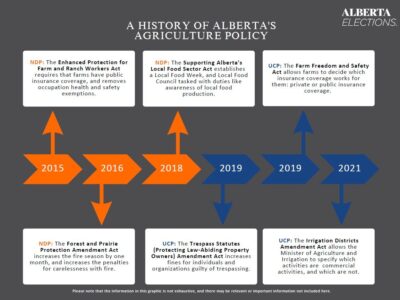Alberta’s Parties share their vision going into election day

Now that the writ has dropped, with election day on May 29th quickly approaching, both parties have shared policies that suggest a vision for the agriculture sector. With limited days remaining, the Simpson Centre has released its final report titled “Agriculture Matters: An Overview of Party Visions” to provide recognition to the agricultural sector and help readers access this difficult-to-find information.
Both UCP and NDP parties have remained relatively quiet on their plans for the agriculture sector, as issues such as healthcare and affordability have taken the forefront. However, a significant contributor to inflation has been the rising cost of food. According to Trevor Tombe, an Economist at the School of Public Policy, average prices for bakery and cereal products went up by 11.3%, fruits by 8.3%, meat by 7.7%, and dairy products and eggs by 7.2% between December and March compared to the corresponding period last year.
Examining the candidates running for election, each party offers a unique perspective on the voices that would be made available to the successful party. The UCP has 11 out of 87 candidates running for the election who come from an agriculture background (13%). It is worth noting that 10 of these candidates currently hold seats in legislature, with four of them having previously served in ministerial roles. The NDP, on the other hand, has 9 candidates running with an agriculture background (10%), and only 1 of them holds a seat in legislature. Both parties also have a former minister of agriculture running, who, if elected, would be able to provide historical knowledge to government.
Moving on to each party’s agriculture platforms, none of the proposals are likely to shift the status quo. Unfortunately, at the time of release, the UCP did not put out many specific agriculture commitments, leading to limited analysis of their approach to agriculture. We encourage readers to stay updated on the latest developments by monitoring the UCP website for the full release of their platform as soon as it becomes available.
The major policy announcement from the UCP is the expansion of the Feeder Assistance Loan Guarantee from $2 million to $3 million for cattle farmers. This promised increase of an extra million dollars will ensure that farmers can access larger capital for feeding cattle through relatively easy access to low-interest rates, leveraged financing backed by a government guarantee. This commitment may not have a significant impact on the agriculture sector, as only 58% of cattle producers and 48% of all producers, according to the report’s survey, considered government subsidizing agriculture input costs as a high priority.
The remaining analysis of the UCP’s approach to agricultural policy focuses on their 2023 budget, which features a major investment through the new Agri-processing Investment Tax Credit program. This program offers a 12% non-refundable tax credit based on eligible capital expenditures to corporations investing $10 million or more to build or expand agri-processing facilities in the province (Alberta n.d). Other significant investments in Budget 2023 include $82 million invested in irrigation projects and $38.5 million invested in Results Driven Agriculture Research (RDAR).
The NDP, on the other hand, has put together a platform of six policy proposals for the agriculture sector:
- Create an Alberta Value-Add Incentive Program to help companies access capital.
- Set up a Local Food Incentive task force.
- Increase staff for services and agri-food and value-added approvals.
- Lower capital borrowing costs for irrigation districts and municipalities.
- Bridge the digital divide and bring high-speed internet to every Albertan by 2027.
- Support post-secondary schools with agriculture programs and ensure agriculture and AgTech are core to any technology strategy.
All six of these items partially address the challenges brought up in our producer survey discussed in our report “Agriculture Matters: Primary Producers’ Voices on Policy in Alberta.” For example, 76% of producers said that investing in innovation and technology was a high priority for them. However, many of these policies are restatements of UCP policies that already existed at the Ministry of Agriculture and Irrigation, such as the commitment to connect all of rural Alberta to broadband by 2027 or the commitment to irrigation investment and favorable capital rates for irrigation projects.
The largest challenge facing the NDP’s ability to govern and set policy for the agriculture sector is the reputation of Bill 6, also known as the 2015 Enhanced Protection for Farm and Ranch Workers Act. This act significantly changed farm safety standards and enhanced protection for farm employees. It required farms to obtain public insurance coverage and eliminated occupational health and safety exemptions previously applicable to farms. This bill faced immediate pushback from farmers who were concerned that the new wage and safety regulations would be applied to children and volunteers assisting in the harvest (Bartko 2015).
Significant concerns still exist in online discourse that, if re-elected, the NDP would bring back this legislation. Rachel Notley gave substance to those concerns on April 27th, when she stated: “we would be looking at it, but we learned from last time and we know that we need to consult with farmers and employers in that sector. We know that we had made good progress after the fact last time in terms of… reaching a lot of agreement with key leaders within the sector. So, we would go back to where that work had left off, and then we would hope to be able to move forward on some elements of it after we have had a chance to really talk about it with some folks in the sector.” (Video timestamp: 15:27- 16:39)
The analysis of each party’s platform commitments shows that a status quo approach is being adopted, suggesting limited significant shifts in agriculture policy. The NDP’s agriculture platform aligns with the preferences of the surveyed producers, but the persistent memory of Bill 6 may dampen its reception. With the UCP leading the polls in rural ridings, except for Banff-Kananaskis, it is likely that rural Alberta holds favorable views towards their approach to agriculture despite no agriculture platform being released (338Canada 2023). It is advised to stay updated on party platforms, as future commitments relevant to the agriculture sector may be unveiled.
All three reports in the Alberta Elections Program are available on the Simpson Centre’s website: https://www.simpsoncentre.ca/events/alberta-elections/. These reports provide readers with a neutral analysis of election platforms and policymaking from an agricultural perspective in advance of heading to the polls.
The Simpson Centre for Food and Agricultural Policy is affiliated with the School of Public Policy at the University of Calgary. We are committed to using evidence-based research and analysis to strengthen Canada’s agriculture sector and improve the food system for all Canadians. We encourage better conversations between industry, government, and the public through accessible and transparent research.
